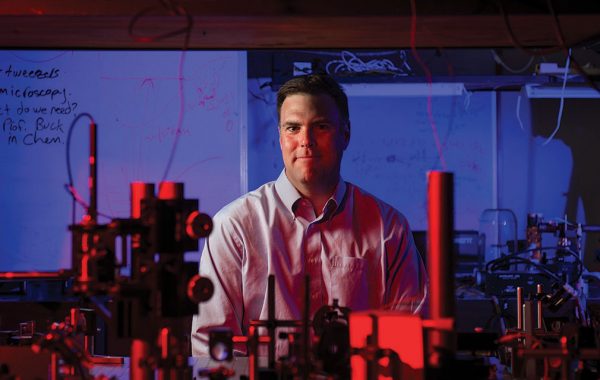Jonathan Habif ’98 is a scientist who thinks small — really small. But the implications of his
research are huge.
A physicist, Habif is developing and testing the tiny technology that may some day be part of the world’s first fully functional quantum computers and the associated quantum information infrastructure.
Habif attended the University of Rochester for his master’s degree and PhD, and while he was there, he worked in a lab researching superconducting quantum computing in collaboration with NASA and was a professor at the Massachusetts Institute of Technology (MIT). (That NASA group included Ken Segall, who is now a professor at Colgate.) Habif also took on a postdoctoral physics fellowship at MIT, where he was recruited by BBN Technologies.
While working at BBN Technologies for the last 12 years, Habif explored the limits and complexities of quantum information processing — technology that transmits data on quantum bits. “A bit is the fundamental unit of information,” Habif said. “A quantum bit is the encoding of information on any quantum particle, such as a photon or atom.”
The bulk of his recent work has been on behalf of U.S. defense and intelligence agencies. “We’ve calculated and demonstrated the fundamental limits, set by the laws of nature, for applications such as covert communications,” Habif said. “With quantum encoding, it is now possible to transmit data that it is impossible to intercept or even detect,” he explained.
In April, Habif joined the University of Southern California’s Viterbi School of Engineering, where he is forming a Boston-based quantum lab team. Because current quantum computers are basically “toys” to demonstrate theory, Habif says his lab will be working to understand how to solve the technical problems that need to be addressed before fullfledged quantum computers become commonplace.
Private industry is putting enormous funding into making quantum computers a reality now that the theory behind the machines has been tested and proven, so Habif estimates that it won’t be long before functioning quantum computers come online.
“I think the timeline is pretty short, quite frankly. Simply [because of] the fact that industry is taking over funding this research. Places like Google and IBM — they don’t do things unless it’s going to be in a product pretty soon,” Habif said. “Let’s call it a decade.”
— Dan DeVries







